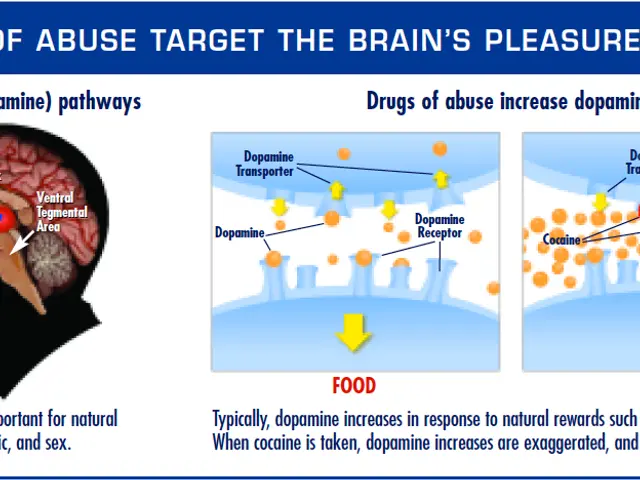Anticipated post-hip replacement recovery phases and appropriate expectations
Hey there! Let's talk about hip replacement surgery, shall we? It's a common procedure to help folks reduce pain and improve mobility when the old hip joint takes a beating. But, as you might imagine, healing and recovery are different for everyone.
So, what can you expect? Most people will be back on their feet in no time for light activities within 3 to 6 weeks. However, before we dive into that, it's essential to prepare for the big day. That means having a chat with your doctor, doing some leg exercises, managing your weight, and dodging cigarettes, if possible.
After surgery, you'll likely spend 1 to 2 days in the hospital, though some people may even head home the same day. That's when the fun begins – and by fun, we mean medication, physical therapy, and learning to move around again. The docs will prescribe painkillers, like opioids and NSAIDs, to help you through the initial phases. You'll need to use a cold compress to keep swelling down and, of course, follow the physical therapist's rather important advice!
As for the incision, the stitches usually come out around 10 to 14 days post-surgery. Pain and swelling should start to ease off around this time, although it may take longer for some. Remember, you're gonna need to keep that wound clean and dry until it's healed.
Around the 3-6 week mark, most people can get back to, well, living a normal life. This includes light activities of daily living, self-care, and even light chores. For many, going back to work is doable at the six-week mark, while sex might be on the cards after six to eight weeks. Physical therapy should remain an essential part of your routine for at least two months to help you recover fully.
After three months, you should be fit enough to resume most daily activities. However, check in with your doc about when it's safe to start doing more rigorous exercises, like swimming or hiking.
• follow physical therapy exercises as a physical therapist instructs• try other gentle exercises, such as daily walking• sit in a reclining position• use a cold compress to reduce swelling• take any prescription medications as a doctor instructs• use walking aids, such as crutches, if necessary
Now, if we're talking about younger folks, don't be too concerned. Modern implants are leading to improved outcomes and survival rates in this age group. On the other hand, older adults should be extra cautious, especially about falls, as they may need additional surgeries if they take a tumble.
• sitting still for long periods• crossing the legs at the knee• bending the hip more than 90 degrees• bending down to touch the feet or ankles• sitting in low chairs• intense exercise, which may involve jumping or sudden turns• moving or lifting heavy objects
Lastly, let's cover hip resurfacing surgery real quick. It's similar to a replacement but involves capping the femoral head instead of removing it. This means you may be able to go home within a day or two, but you'll still need a walking aid for a while. Recovery and outcomes for this procedure are much the same as a regular replacement, though.
The good news? Most folks experience less pain, better mobility, and improved overall quality of life following a hip replacement. But, remember, long-term effects may include some numbness, pain, or stiffness around the incision site. Also, there may be a few lifestyle changes, such as how metal detectors or dental procedures affect your new joint.
Stay strong, learn the ropes, and you'll be back to your old self in no time! Oh, and listen to your doc – they've likely got some wise words to share about what to do and what to avoid during your recovery journey.
- In addition to discussing hip replacement surgery, let's also delve into various chronic diseases such as Alzheimer's, obesity, COPD, AQ, ulcerative colitis, and cancer, which are critical aspects of health and wellness.
- Just as physical therapy plays a crucial role in hip replacement recovery, it's also a key component in managing other chronic diseases like mental health conditions.
- A balanced nutrition plan is vital in combating chronic diseases like Alzheimer's, obesity, and some forms of colitis.
- Aging gracefully requires focusing on cardiovascular health, fitness and exercise, and mental health, alongside understanding and managing chronic diseases like COPD and ulcerative colitis.
- Predictive science may hold the key to early detection and successful treatment of chronic diseases like Alzheimer's, cancer, and even age-related conditions like cardiovascular disease.
- Science and medical advancements have led to improved outcomes in cancer treatments, as well as in hip replacement surgeries, making them more accessible to younger patients.
- Chronic diseases, including cancer, can have long-term effects on mental health, making mental health therapies and treatments essential for holistic care.
- The management of chronic diseases often involves making lifestyle changes, such as altering one's diet for better nutrition or incorporating fitness and exercise routines for cardiovascular health.
- While hip replacement surgery can improve overall quality of life, it's important to remember that chronic diseases like Alzheimer's, obesity, and cancer require ongoing management and commitment to improving health and wellness.







